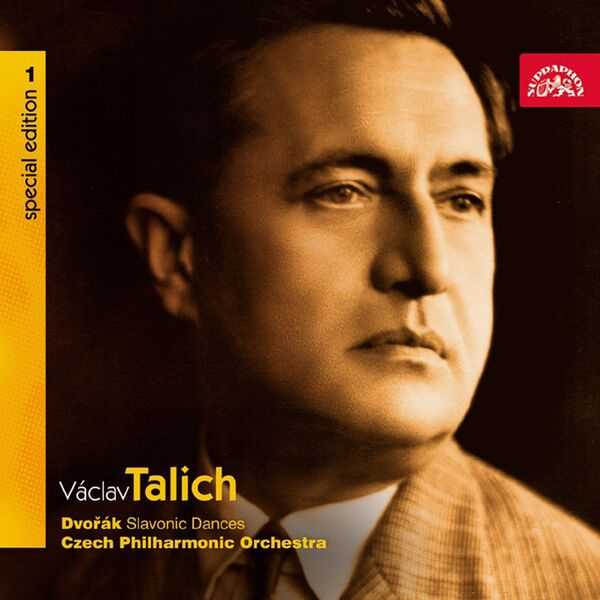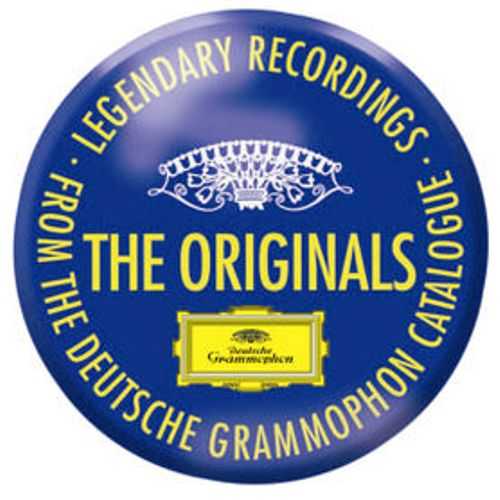
Conductor: Václav Talich
Number of Discs: 19
Format: FLAC (tracks)
Label: Supraphon
Catalogue: SU38212-SU38372
Release: 2005-2007
Size: 2.94 GB
Recovery: +3%
Scan: cover
Vol. 01
Dvořák: Slavonic Dances, Series I., Op. 46
01. 1 in C major (Presto). Furiant
02. in E minor (Allegretto scherzando). Dumka
03. in A flat major (Poco allegro). Polka
04. in F major (Tempo di minuetto). Sousedská
05. in A major (Allegro vivace). Skočná
06. in D major (Allegretto scherzando). Sousedská
07. in C minor (Allegro assai). Skočná
08. in G minor (Presto). Furiant
Dvořák: Slavonic Dances, Series II., Op. 72
09. in B major (Molto vivace). Odzemek
10. in E minor (Allegretto grazioso). Mazur
11. in F major (Allegro). Skočná
12. in D flat major (Allegretto grazioso). Dumka
13. in B flat minor (Poco adagio. Vivace). Špacírka
14. in B flat major (Moderato, quasi minuetto). Polonéza
15. in C major (Presto). Srbské kolo
16. in A flat major (Lento grazioso, quasi tempo di valse). Sousedská
– The exuberant start of a special edition dedicated to a conducting legend of the 20th century-Václav Talich.
– 16 Slavonic Dances in an extraordinary interpretation by Václav Talich and the Czech Philharmonic from the historic 1950 Supraphon recording.
– A version which established the interpretational tradition of the Slavonic Dances, admired in its time and still magical today.
– Talich’s Dvořák not as “a musician who writes dance music, but as a poet of rhythm.”
– The eight Slavonic Dances from 1878 (originally for piano, four hands) were one of Dvořák’s first steps towards world renown. “A divine naturalness flows through this music. Not a trace of anything mechanical or forced,” wrote one critic. Dvořák wrote an additional eight dances in 1886 when he was already a famous composer, and later orchestrated both sets.Václav Talich – an ingenious conductor of the Czech Philharmonic
Vol. 02
Smetana: Czech Song. Cantata for Mixed Voices and Orchestra
01. Moderato
02. Andante
03. L’istesso tempo. Allegretto
04. Moderato
05. Moderato maestoso
Suk: A Fairy – tale. Suite from the Music to Julius Zeyer’s Dramatic Tale Radúz and Mahulena, Op. 16
06. About the Faithful Love of Radúz and Mahulena and their Sorrows (Adagio, ma non troppo)
07. The Game of the Swans and the Peacocks (A la polka)
08. Funeral Music (Andante sostenuto)
09. Runa’s Curse and How It was Broken by Love (Allegro appassionato)
Novák: Slovácko Suite for Small Orchestra, Op. 32
10. In the Church. Andante
11. Among Children. Vivace, giocoso
12. The Amorous Couple /The Lovers/. Andante quasi allegretto
13. The Country Musicians. Allegro strepitoso
14. At Night. Andante
– Talich conducts classic Czech works.
– Talich’s 1954 interpretation of Smetana’s cantata Czech Song on CD for the first time.
– Talich’s composer friends – Josef Suk a Vítězslav Novák.Their pieces constituted a major portion of Talich’s repertoire with the Czech Philharmonic.
– “Authentic interpretations of Suk’s suite A Fairy Tale (1901) and Novák’s Moravian-Slovak Suite (1903).”
– Music critic Karel Šrom, 1943: “Novák and Suk invested a tremendous amount of emotion into these pieces. Talich, who feels their works with them, invests the same into every performance. Each of Talich’s performances is an attempt at uniqueness, literally inimitable.”Václav Talich – an incomparable interpreter of Suk and Novák
Vol. 03
01. Suk: Ripening. Symphonic Poem, Op.34
Janáček: Taras Bulba. Rhapsody for Orchestra
02. The Death of Andrei
03. The Death of Ostap
04. The Prophecy and Death of Taras Bulba
– The zenith of Czech symphonic music of the 20th century. Suk’s autobiographical Ripening (1912-1917) and Janáček’s Taras Bulba (1915-1918), a musical drama based on the novel by N. V. Gogol.
– Václav Talich: “I love Janáček. Just as I love Josef Suk. They have penetrated the abysmal depths where the human soul is tossed about as no other of our creative musicians has.”
– Talich was closely connected not only to both composers, but also to both works. He conducted the world premiere of Ripening (October 30, 1918) and the Prague premiere of Taras Bulba(November 9, 1924).
– Leoš Janáček to Talich after the Prague performance of Taras Bulba: “You have brought me great joy with your exemplary interpretation of Taras Bulba.î
– Josef Suk toVáclav Talich: “You, my dear friend, are the first who understood what I wanted and let my pieces resound with an unsuspected, even miraculous effect.”Talich’s stirring interpretation of Taras Bulba and The Ripening
Vol. 04
Mozart: Sinfonia concertante for Oboe, Clarinet, French Horn, Bassoon and Orchetra in E flat major, K. dod.I.9 (297b)
01. Allegro
02. Adagio
03. Andantino con variazioni
Mozart: Symphony No. 39 in E flat major, K. 543
04. Adagio. Allegro
05. Andante con moto
06. Menuetto. Allegretto
07. Finale. Allegro
Václav Talich conducts Mozart The Sinfonia Concertante in E-flat major as performed by the renowned Czech Philharmonic Wind Quintet, one of the best Czech chamber ensembles. They brought contemporary music as well as the music of the old masters to concert halls throughout Europe, as well as in New Zealand, Australia and Indonesia. They performed Mozart’s Sinfonia Concertante with Václav Talich in 1949. Oboist and Quintet member Josef Shejbal, : “I consider this performance to be technically clean and stylistically, absolutely flawless.” The first of Mozart’s finaltrio of symphonies, the zenith of his orchestral artistry – the great Symphony in E-flat major as rendered by Talich. One of the conductor’s last recordings from March, 1955.
Vol. 05
Dvořák: Concerto for Piano and Orchestra in G minor, Op.33
01. Allegro agitato
02. Andante sostenuto
03. Finale. Allegro con fuoco
Dvořák: Concerto for Cello and Orchestra No. 2 in B minor, Op. 104
04. Allegro
05. Adagio, ma non troppo
06. Finale. Allegro moderato
Dvořák’s two instrumental concertos performed by masters of their instruments. The piano concerto, long underrated as being insufficiently brilliant and virtuoso, performed by one of the great Czech pianists, František Maxián. The violoncello concerto, the last work that Dvořák wrote during his stay in the United States. One of the world’s finest cello concertos performed by legendary cellist Mstislav Rostropovich. In 1952 Rostropovich, then 25, fascinated Prague audiences and critics alike: “Overall, Rostropovich’s interpretation of Dvořák is lively, active, at times even tempestuous. His Dvořák brims with youthful life, the joy of movement and melody, here with optimism, there on the other hand with young, poetic dreaminess. It is a performance which bears themark of a great artistic personality and strong individuality in every measure, yet honors and bows with respect before the composer, at whose service he places the whole of his enormous talent.” For Rostropovich, working with Talich was and is an unforgettable experience: “I consider this recording of Dvořák’s Violoncello Concerto to be my very best. And although I latermade seven more recordings of this concerto, this is the one that means the most to me. All my life I have remained true to what Václav Talich taught me.” (Mstislav Rostropovich) Enthusiastic responses not only from the critics: “Some time after the album was released my friend Sviatoslav Richter called to say that he had just listened to the recording with Václav Talich, and that in his opinion it was absolutely ingenious. He was excited. (Mstislav Rostropovich)
Vol. 06
Smetana: My Country. A Cycle of Symphonic Poems
01. Vyšehrad (Lento – Largo maestoso – Grandioso – Allegro vivo ma non agitato – Lento ma non troppo – Largamente)
02. Vltava (Allegro comodo, non agitato)
03. Šárka (Allegro con fuoco, ma non agitato – Piu moderato assai – Moderato ma con calore – Adagio. Moderato – Molto vivo)
04. Z českých luhů a hájů (Molto moderato – Allegro poco vivo, ma non troppo – Presto)
05. Tábor (Lento – Molto vivace – Lento maestoso)
06. Blaník (Allegro moderato – Andante non troppo – Piu allegro, ma non molto – Tempo di marcia – Largamente maestoso – Piu vivo)
The third and most mature of Talich’s recordings of My Country
– One of the treasures of Czech music in a fascinating interpretation by the Czech Philharmonic, conducted by Václav Talich – majestic Vyšehrad, energetic Vltava, passionate Šárka, lyrical Fields and Groves, suggestive Tábor, triumphant Blaník.
– My Country – a lifelong artistic challenge for Václav Talich.
– “It is a most clear and dear expression which you convey to us with such love, which strengthens our hope and faith.” wrote Talich’s listeners of My Country during WWII.
– The third and most mature of Talich’s recordings of My Country, following his versions of 1929 and 1940.
Vol. 07
01. Dvořák: The Water Goblin. Symphonic Poem, Op. 107
02. Dvořák: The Noon Witch. Symphonic Poem, Op. 108
03. Dvořák: The Golden Spinning Wheel. Symphonic Poem, Op. 109
04. Dvořák: The Wild Dove. Symphonic Poem, Op. 110
Václav Talich – A master of orchestral tone colour
– Talich’s extraordinary imagination and timbral magic.
– The broad palette of orchestral colours from the scores of Dvořák’s symphonic poems The Water Goblin, The Noon Witch, The Golden Spinning Wheel and The Wild Dove – musical ballads from Dvořák’s later works.
– Talich’s performance in the eyes of his contemporaries:
– “Dvořák’s Wild Dove, in beautifully refined sound, was wrapped in the magically secretive glow of a ballad.” … “The motives come to life, tragic conflicts take on real gravity and independence from the limited scope of the stories.”
Vol. 08
Wagner: Tristan und Isolde. Opera in 3 Acts
01. Overture
02. Isoldes Liebestod
Tchaikovsky: Symphony No. 6 in B minor, Pathétique, Op. 74
03. Adagio – Allegro non troppo
04. Allegro con grazia
05. Allegro molto vivace
06. Finale. Adagio lamentoso
A storm of emotions in an ingenious interpretation conducted by Václav Talich
– A storm of emotions in an ingenious interpretation.
– The zenith of romantic music conducted by Václav Talich.
– Wagner’s music of love and Tchaikovsky’s passion-filled last work.
– Tchaikovsky on his symphony: “I certainly consider it to be the best and most honest of all my things. I love it as I have never loved the rest of my musical children.”
Vol. 09
Mozart: Le nozze di Figaro. Opera in 4 Acts (Le nozze di Figaro), K. 492
01. Ouverture
Mozart: Die Zauberflöte
02. Overture, K. 620
Mozart: Symphony No. 33 in B flat major, K. 319
03. Allegro assai
04. Andante moderato
05. Menuetto. Trio
06. Finale. Allegro assai
Mozart: Symphony No. 38 in D major Prague, K. 504
07. Adagio. Allegro
08. Andante
09. Finale. Presto
Tchaikovsky: Suite for Orchestra No. 4 in G major Mozartiana, Op. 61
10. Gigue. Allegro
11. Menuetto. Moderato
12. Preghiera. Andante con moto
13. Theme et variations. Allegro giusto
“A beautiful crystal that sparkles with eternal fire.” (Václav Talich on Mozart’s music)
Mozart full of life, drama and tension.
Overture to the opera The Magic Flute, Symphonies nos 33 and 38 “Prague”-rare live recordings of Talich with the Czech Philharmonic in 1954.
Tchaikovsky’s colorful “tribute to Mozart and the old masters”-Mozartiana as performed by the Slovak Philharmonic.
Vol. 10
CD 01
Dvořák: Stabat Mater. Cantata for Soloists, Choir and Orchestra, Op. 58
01. Stabat Mater dolorosa – Andante con moto
02. Quis est homo, qui non fleret – Andante sostenuto
03. Eja, Mater, fons amoris – Andante con moto
04. Fac, ut ardeat cor meum – Largo
05. Tui Nati vulnerati – Andante con moto, quasi allegretto
06. Fac me vere tecum flere – Andante con moto
07. Virgo virginum praeclara – Largo
08. Fac, ut portem Christi mortem – Larghetto
09. Inflammatus et accensus – Andante maestoso
CD 02
Dvořák: Stabat Mater. Cantata for Soloists, Choir and Orchestra, Op. 58
01. Quando corpus morietur – Andante con moto
Suk: Asrael. Symphony for Large Orchestra in C minor, Op. 27
02. Andante sostenuto
03. Andante
04. Vivace
05. Adagio
06. Adagio e maestoso – Allegro appassionato
07. Suk: Asrael
Two Introspective Testimonies of Pain and of Overcoming Pain.
Stabat Mater-a sacred cantata born of the sudden death of three of Dvořák’s children.
Asrael-a vast funereal symphony written by Suk in mourning for his teacher and father in law Dvořák and for his wife, Dvořák’s daughter Otylie.
“It was truly necessary to experience life and to know human misery, so that I could bow before the Stabat.” (Václav Talich)
Václav Talich Speaks-bonus. A unique recording of Talich’s speech to the orchestra during the recording of Suk’s Asrael on the day of theconductor’s 69th birthday.
Vol. 11
Dvořák: In Nature’s Realm. Concert Overture for Orchestra, Op. 91
01. In Nature’s Realm, Op. 91, B 168
Dvořák: Carnival. Overture, Op. 92
02. Carnival, Op. 92, B 169
Dvořák: Nature, Life and Love. A Cycle of Concert Overtures, Op. 91-93
03. Othello, Op. 93, B 174
Dvořák: Waltz in A major No. 1, Op. 54
04. Moderato (in A major)
Dvořák: Waltz in D major No. 4, Op. 54
05. Allegro vivace (in D flat major)
06. Dvořák: Polonaise in E flat major
Dvořák: Rusalka. Opera in 3 Acts, Op. 114
07. Polonaise
Dvořák: Waltzes for String Orchestra, Op. 54 B.101
08. Moderato (in A major)
09. Allegro vivace (in D flat major)
“Antonín Dvořák knew how to listen to nature. The material values of objects change into spiritual values of music.” (Václav Talich)
The dreamy overture In Nature’s Realm, lively Carnival and dramatically suspenseful Othello.
The enchantment of Dvořák’s short pieces – two waltzes and two polonnaises.
Bonus – a 1940 recording of Dvořák’s Waltzes with the Czech Philharmonic.
Vol. 12
Dvořák: Symphony No. 6 in D major, Op. 60
01. Allegro non tanto
02. Adagio
03. Scherzo (Furiant). Presto
04. Finale. Allegro con spirito
Dvořák: Symphony No. 7 in D minor, Op. 70
05. Allegro maestoso
06. Poco adagio
07. Scherzo
08. Finale. Allegro
The 12th title of our Talich Special Edition features recordings captured in the famous Abbey Road studios in November, 1938. They present Talich as one of the most renowned conductors (not only of Europe, but of the whole musical world) during the era between WWI and WWII. Talich was, for example, guest conductor of the Scottish Orchestra (conducting 26 of the 30 concerts in its 1926-27 season!), and one of the many glowing reviews from that period bears the all-revealing title “Talich-The Magician”. Dvořák’s 7th Symphony is also connected to the British Isles, as it was written on a commission from the London Philharmonic Society, which had made Dvořák an honorary member in 1884; Dvořák himself conducted the premiere in London on April 22, 1885.
Vol. 13
Dvořák: Symphony No. 8 in G major, Op. 88
01. Allegro con brio
02. Adagio
03. Allegretto grazioso
04. Allegro ma non troppo
Dvořák: Symphony No. 9 in E minor From The New World, Op. 95
05. Adagio – Allegro molto
06. Largo
07. Scherzo – Molto vivace
08. Allegro con fuoco
This late recording of Dvořák’s two most famous symphonies presents Václav Talich as a conductor who constantly discovered new depths even in works he had already performed many times, a trait which demanded extreme flexibility from his orchestras. W. Furtwängler is said to have proclaimed that “all the masters of the baton around Talich were somewhat nervous about what he would come up with this time”. The seventy year old Talich himself commented on this before his last recording of the “New World”: How much youthful arrogance and pride is dissolvedin the wise realization that there is no goal, but only a mere direction towards a goal; no joy in what is found, but only delight in searching; that life is no comfortable sitting in a soft armchair, but only an exhausting walk in rough terrain.
Vol. 14
Händel: Concerto for Oboe and Orchestra No. 3 in G minor, HWV 287
01. Grave
02. Allegro
03. Sarabande. Largo
04. Allegro
Bach: Concerto for Piano and Orchestra No. 1 in D minor, BWV 1052
05. Allegro
06. Adagio
07. Allegro
Bach: Suite in D major
08. Ouverture
09. Air
10. Gavotta I., II.
11. Bourrée
12. Gigue
Václav Talich and the young Sviatoslav Richter made this now-legendary recording of the Bach piano concerto on the evening before their joint concert in June, 1954. Richter had become the brightest star of that year’s Prague Spring festival, the first at which Talich had been able to conduct after many years of being barred from performing by the communists. Bach, (along with Romantic composers and Russian composers) featured prominently in Richter’s repertoire, and Talich had also been an avid propagator of Bach’s Suite in D Minor in the Czech Republic in thelate 1940’s. Also on this album: G. F. Händel’s oboe concerto, performed by František Hanták, an outstanding soloist of the Czech Philharmonic.
Vol. 15
Mozart: Concerto for Violin and Orchestra No. 4 in D major, K 218
01. Allegro
02. Andante cantabile
03. Rondeu. Andante grazioso Allegro ma non tropo
Mozart: Concerto for Clarinet and Orchestra in A major, K. 622
04. Allegro
05. Adagio
06. Rondo. Allegro
Mozart: Wind Serenade in B flat major “Gran Partita”, K 361/370a
07. Largo – Allegro molto
08. Romanza. Adagio. Allegretto. Adagio
09. Thema con variazioni
10. Rondo. Allegro molto
Bonus (from Mozart’s Concerto for Children)
11. Václav Talich speaking to a young audience
“This ingenious fellow must have been tossed about by some passions which we don’t know about anymore today which, together with his mad creative bent, hastened his demise!” Talich was speaking about his beloved Mozart, the composer of the works on this CD which features a live recording of the Serenade No. 10 as Talich performed it with the Czech Philharmonic wind players in 1954. It also features two outstanding soloists: violinist Jiří Novák (b. 1924), was chosen by Talich to be concert master of the Czech Chamber Orchestra in 1945 while still a conservatory student. Novák went on to become 1st violin of the young Smetana Quartet, with which he played and recorded with tremendous success all over the world until the end of the ensemble’s career in 1989. Vladimír Říha (1905-1978) was the clarinetist of the Czech Philharmonic for nearly a quarter of a century, but also played with the Prague Wind Quintet and a number of other ensembles including the Smetana Quartet. His archival recordings are highly regarded by clarinetists even today.
Vol. 16
Benda: Sinfonia in B flat major
01. Moderato
02. Allegretto
03. Allegro vivacissimo
Dvořák: String Serenade in E major, Op. 22
04. Moderato
05. Tempo di Valse
06. Scherzo. Vivace
07. Larghetto
08. Finale. Allegro vivace
Suk: String Serenade in E flat major, Op. 6
09. Andante con moto
10. Allegro ma non troppo e grazioso
11. Adagio
12. Allegro giocoso, ma non troppo presto
Tchaikovsky: String Quartet No. 1 in D major, Op. 11
13. Andante cantabile
14. Tchaikovsky: Song Without Words in F major, Op. 2, No. 3
Chamber music played an important role in Talich’s life, especially in the early and later parts of his career. One of the most significant episodes of his life was the brief post-war story of the Czech Chamber Orchestra (1946-1948), an ensemble that was faithfully devoted to him during a period of unjust attacks on his character. In addition to the Sinfonia in B flat major by J. A. Benda, one of the leading personalities of early Classicism, and the Andante Cantabile by P. I. Tchaikovsky, this album offers two often-played serenades by Antonín Dvořák and JosefSuk. The Serenade in E flat major was the answer of eighteen years old Suk to Dvořák’s advice to “finally stop with that constant minor and write something fresh and youthful”. The Serenade in E major, one of Dvořák’s most beautiful chamber works, was written in 1874 and was originally intended for the Vienna Philharmonists. In both we hear the genius of the composer blended with Talich’s sensitive, inspiring interpretation.
Vol. 17
CD 01
Smetana: My Country. A Cycle of Symphonic Poems
01. Vyšehrad (Lento. Largo maestoso – Grandioso – Allegro vivo ma non agitato – Lento ma non troppo – Largamente)
02. Vltava (Moldau) (Allegro comodo, non agitato)
03. Šárka (Allegro con fuoco, ma non agitato – Piu moderato assai – Moderato ma con calore – Adagio. Moderato – Molto vivo)
Blodek: In the Well. Comic Opera in 1 Act
04. Ouverture
05. Kovařovic: Miners’ Polka for Orchestra
06. Smetana: To Our Maidens / Our Lassies. Polka
Smetana: Libuše. Festive Opera in 3 Acts
07. Overture
Smetana: The Two Widows. Opera in Two Acts
08. Act 2: Anežka Arias
09. Smetana: The Prague Carnival. Introduction and Polonaise (1883)
CD 02
Janáček: The Cunning Little Vixen. Orchestral Suite from the Opera
01. Part I (Andante)
02. Part II (Allegro)
Suk: A Fairy – tale. Suita from the Music to Julius Zeyer’s Dramatic Tale Radúz and Mahulena, Op. 16
03. The Game of the Swans and the Peacocks (A la polka)
04. Dvořák: The Noon Witch. Symphonic Poem, Op. 108
90 Years of Czech Philharmonic Orchestra
05. Václav Talich speaking – Rehearsal of Dvořák’s Symphony “From the New World” – movement 4th – bonus
06. Speech after being wished well on Talich’s name day – bonus
Dvořák: Concerto for Cello and Orchestra No. 2 in B minor, Op. 104
07. Rehearsal od Dvořák’s Cello concerto – bonus
08. Václav Talich reminiscences
The final title in the Talich Special Edition series is a sort of chronological cross-section of Talich’s recordings. It opens with the symphonic poem Šárka, recorded in 1929 when Talich first caught the recording bug, accepting an offer from His Master’s Voice to record Smetana’s complete My Country with the Czech Philharmonic. The recording presents Talich at the peak ofhis powers, standing at the head of his polished and devoted Czech Philharmonic and lauded as one of the greatest directors on the European continent. Talich and the Czech Philharmonic also recorded a remarkable series of Czech compositions (including the Slavonic Dances, Prague Carnival, and Suk’s Serenade for String Orchestra) during the 1930’s in London. The recording of theoverture to Smetana’s Libuše, an opera whose performance had long been forbidden by the Nazis, dates from 1940-41. Rare recordings from rehearsals give us a unique glimpse into Talich’s creative process.
talich-special-edition-02.rar – 146.7 MB
talich-special-edition-03.rar – 146.2 MB
talich-special-edition-04.rar – 139.3 MB
talich-special-edition-05.rar – 160.3 MB
talich-special-edition-06.rar – 180.1 MB
talich-special-edition-07.rar – 165.9 MB
talich-special-edition-08.rar – 134.1 MB
talich-special-edition-09.rar – 195.2 MB
talich-special-edition-10.rar – 320.7 MB
talich-special-edition-11.rar – 158.8 MB
talich-special-edition-12.rar – 184.1 MB
talich-special-edition-13.rar – 191.4 MB
talich-special-edition-14.rar – 142.5 MB
talich-special-edition-15.rar – 194.1 MB
talich-special-edition-16.rar – 182.6 MB
talich-special-edition-17.rar – 294.7 MB



